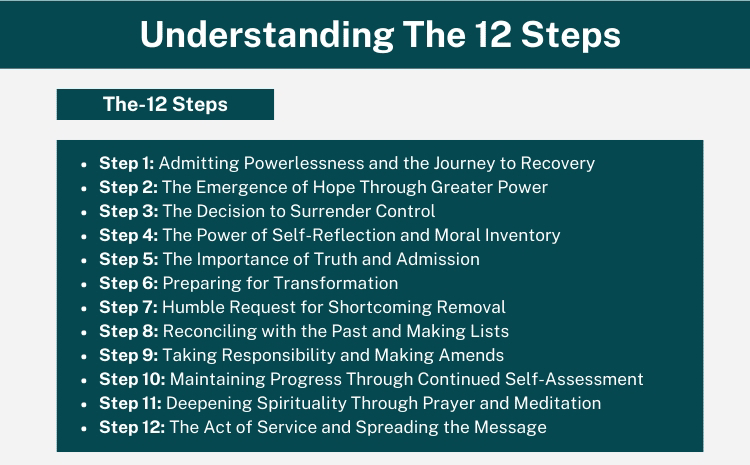Alcoholics Anonymous (AA) has been a beacon of hope for individuals struggling with alcohol addiction since its inception in 1935. The program's foundational principles, encapsulated in the twelve steps, have guided countless individuals toward sobriety and spiritual growth. Each step represents a key milestone in the journey of self-discovery and recovery. In this article, we delve into the 12 Steps of Alcoholics Anonymous, exploring their significance and impact on individuals seeking to overcome alcohol addiction.
Step 1: Admitting Powerlessness
The first step in AA involves acknowledging one's powerlessness over alcohol and the unmanageability of their life as a result of addiction. By accepting this reality, individuals open themselves to the possibility of change and seek support from others who have walked a similar path.
Step 2: Finding Hope in Higher Power
Step 2 encourages participants to believe in a higher power that can restore sanity and provide the strength needed to overcome addiction. This step lays the foundation for spiritual transformation and underscores the importance of faith in the recovery process.
Step 3: Surrendering to Higher Power
In Step 3, individuals make a decision to turn their will and lives over to the care of their higher power. This act of surrender marks a significant shift in mindset, as individuals relinquish control and embrace a new way of living guided by spiritual principles.
Step 4: Taking a Moral Inventory
Self-reflection is central to Step 4, which involves conducting a thorough moral inventory of one's past actions and behaviors. By confronting their shortcomings and character defects, individuals gain insights into the underlying causes of their addiction and pave the way for personal growth.
Step 5: Admitting Wrongs to Others
Step 5 emphasizes the importance of honest self-disclosure to oneself, a higher power, and another human being. By sharing the results of their moral inventory with a trusted individual, participants experience catharsis, accountability, and a deepening connection with others.
Step 6: Willingness to Change
Step 6 revolves around a willingness to let go of character defects and negative patterns of behavior. Participants commit to working on themselves and preparing for transformation with the help of their higher power and supportive community.
Step 7: Humility and Self-Improvement
Humility takes center stage in Step 7, as individuals humbly ask their higher power to remove their shortcomings. This step fosters a sense of accountability, openness to change, and a willingness to seek guidance and support along the journey to recovery.
Step 8: Making Amends
In Step 8, participants compile a list of individuals they have harmed and become willing to make amends to them. This process of reconciliation promotes healing, forgiveness, and the restoration of broken relationships, paving the way for emotional and spiritual growth.
Step 9: Making Direct Amends
Step 9 involves taking concrete steps to apologize and make amends to those individuals identified in Step 8. By demonstrating genuine remorse and a commitment to change, participants repair past harm and cultivate a sense of integrity and accountability in their relationships.
Step 10: Continued Self-Reflection
Self-discipline and introspection are paramount in Step 10, which entails ongoing self-assessment and a prompt admission of any new wrongdoings. By staying vigilant and responsive to their thoughts and actions, individuals maintain accountability and personal integrity in their daily lives.
Step 11: Seeking Spiritual Connection
Step 11 urges participants to seek spiritual growth and connection through prayer and meditation. By nurturing their relationship with a higher power, individuals cultivate inner peace, wisdom, and guidance as they navigate the challenges of recovery and daily living.
Step 12: Helping Others and Sustaining Recovery
The final step of AA emphasizes the importance of service and giving back to others in need of support. By sharing their experience, strength, and hope with newcomers and actively participating in the recovery community, individuals reinforce their own commitment to sobriety and contribute to the healing of others.
The 12 Steps of Alcoholics Anonymous offer a structured and transformative path to recovery for individuals grappling with alcohol addiction. By embracing these guiding principles and practices, participants embark on a journey of self-discovery, spiritual growth, and healing that transcends addiction. Through mutual support, accountability, and a deepening connection with a higher power, individuals in AA find hope, resilience, and the courage to rebuild their lives free from the shackles of alcoholism.












0 Comments